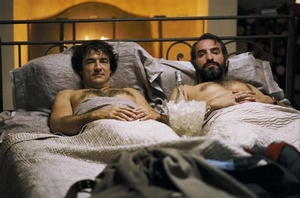Mark:
When it comes to the absurd fantasies of French filmmakers, it would seem hard to top the latest work by French auteur Bertrand Blier for sheer audacity, although whether The Clink of Ice will cause delight or dismay remains to be seen.
When Charles Faulque (Jean Dujardin), an alcoholic former writer and Pulitzer Prize winner, is visited at his country estate by a man (Albert Dupontel) only he can see, opportunities will arise for redress of past mistakes and amelioration of ongoing ones, but not before those mistakes are brought into the sharpest of focus and he is forced to examine his place in the lives of those he loves. Meanwhile, his housekeeper Louisa (Anne Alvaro) is harbouring her own secrets while labouring to support the lifestyle of a man many would despise.
Meanwhile, his housekeeper Louisa (Anne Alvaro) is harbouring her own secrets while labouring to support the lifestyle of a man many would despise.
If the description seems deliberately obtuse, it is necessarily so, as the revelation of the nature of Faulque’s mystery house-guest provides much of the very little interest this film provoked in this viewer. Although this could be seen as an experiment in farce that doesn’t quite work, the film does raise occasional questions about the meaning of life and the importance of examining one’s place in it. It’s just that those moments are surrounded by the kind of absurdist comedy so typical of French filmmaking that so completely fails to capture my imagination.
Were it not for the performances of the three lead actors, The Clink of Ice might well have been unwatchable: Dujardin and Dupontel are both highly regarded stars of French cinema, and they develop an uneasy rapport that perfectly suits the nature of their relationship. It is the performance of Alvaro as the steadfast and moderate Louisa, however, that grounds the film and allows its audience to engage in the more highly strung antics of the two male leads. The rather incredible turn Louisa’s character takes later in the film is all the more jarring because of this.
Although it could be said that a film like this challenges audience preconceptions and encourages discussion and debate, this will be greatly diminished by the dramatic and rather-too-fantastic denouement that allows the characters an easy escape that is simply dishonest and unhelpful. While it does not seem unreasonable to lighten the mood when examining the devastation that can result for people facing this issue, wrapping things up as they are with the suggestion that the characters have learnt their life lessons is insincere at best.
But maybe I just don’t get French comedy?
Rating: